
via FOX News http://ift.tt/2nsuWvr

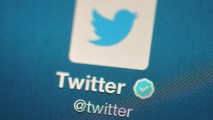




Dado Ruvic / Reuters
Twitter on Wednesday said it notified 1.4 million people in the US that they engaged with Kremlin-linked troll accounts during the 2016 US election. That's more than double the 677,775 people Twitter initially said it would notify earlier this month.
"We have expanded the number of people notified about interactions with Twitter accounts potentially connected to a propaganda effort by a Russian government-linked organization known as the Internet Research Agency," Twitter said in an updated blog post. "Approximately 1.4 million people have now received a notification from Twitter."
Twitter said the people it notified had either retweeted, quoted, replied to, mentioned, or liked the Internet Research Agency's content. It also said the updated number includes people who have opted out of most of Twitter's email updates.
The update marks yet another hiccup in Twitter's uneven response to Congress's concerns over its ability to protect its platform from foreign manipulation. Twitter also said the number of people notified may still grow in time. "As our review continues, we may also email additional users," the company said. "If and when we do so, we will do our best to keep the public updated."
Here's the full update:
We have expanded the number of people notified about interactions with Twitter accounts potentially connected to a propaganda effort by a Russian government-linked organization known as the Internet Research Agency. Our notice efforts are focused on certain types of interactions, and they will not encompass every person that ever saw this content. Our goal in providing these notifications is to advance public awareness of and engagement with the important issues raised in our blog post, and provide greater transparency to our account holders and the public.
We have now sent notices to Twitter users with an active email address who our records indicate are based in the US and fall into at least one of the following categories:
Approximately 1.4 million people have now received a notification from Twitter. We will be sending a short survey to a small group of people who received our notification to gain feedback on this process. As our review continues, we may also email additional users. If and when we do so, we will do our best to keep the public updated.






Andrew Burton / Getty Images
Publishers are freaking out about Facebook’s plan to show 20% less news in the News Feed. But over the past four months, Facebook already has become a less dominant social traffic source for publishers while Twitter has ticked upward, according to new data obtained by BuzzFeed News. The development could potentially mitigate the negative effects of Facebook’s News Feed changes on media companies.
"News publishers and journalists are essential to Twitter, and we strive to be a dependable, valuable partner. Their success is our priority,” Twitter director of global news partnerships Peter Greenberger told BuzzFeed News. Facebook did not respond to a request for comment.
In October 2017, Facebook sent 4.7 visitors to publishers for every one visitor Twitter sent, according to data from SocialFlow, a publishing tool used by approximately 300 major publishers, including the New York Times and Wall Street Journal. Since then, referrals from Facebook declined and those from Twitter rose. This month, Facebook is sending just 2.5 visitors to publisher sites for every one sent by Twitter, essentially cutting the lead in half. SocialFlow’s data spans 10.1 million social posts and 2.8 million clicks.

SocialFlow
Twitter’s growing capacity to send meaningful traffic to publishers marks a somewhat remarkable transformation for a company long-known for its ability to drive the news cycle but not the news business. Its emergence as a viable social traffic source could help dull the hit many publishers stand to take when Facebook’s News Feed changes roll out broadly in the coming months. And for some publishers, Twitter is already proving its mettle as a Facebook-esque traffic source.
“Twitter has always been an important place for us to reach a hyper-engaged audience and now we’re seeing the traffic it drives beginning to rival that of Facebook,” Esquire.com site director Michael Sebastian told BuzzFeed News.
SocialFlow CEO Jim Anderson told BuzzFeed News that Twitter’s recent product tweaks are likely responsible. Longer tweets, Anderson said, are generating more engagement than shorter tweets for publishers. And the algorithm is likely helping too. “It stands to reason that professionally produced content is going to do well with algorithms.” Anderson said.
In 2017, Google surpassed Facebook as the top traffic referrer to publishers. Add in Twitter’s recent uptick, and the future for publishers might not look as dire as some predict. “We’ve seen substantial Twitter usage from our media clients for years,” Anderson said. “It’s nice to see a return for your efforts.”


Johannes Eisele / AFP / Getty Images
The US Department of Justice has begun the first stages of an inquiry into Apple's decision to release software updates that slow down older iPhone models, reported Bloomberg News Tuesday afternoon. According to the report, "people familiar with the matter" said the DOJ and Securities and Exchange Commission have both requested information from Apple.
Apple did not immediately respond to a request for comment.
Back in December, Apple admitted that it recently released a feature for the iPhone 6, 6S, SE, and 7 that slowed down the iPhone's processor when it sensed a decayed battery. In subsequent statements, the company suggested it did this to prevent iPhones from malfunctioning or shutting down.
Tuesday's report comes during a difficult month for the company. In response to harsh criticism from users and the media, Apple offered users a discount on replacement batteries, selling them for $29. But the company came under fire again after reporting that the replacement batteries were backlogged and wouldn't arrive for users until late March or early April. Similarly, a report in Axios this week suggests that Apple will be delaying iOS updates due to performance and reliability issues.
The news about the DOJ inquiry also comes just one day before Apple will report its earnings and, according to reports, is expected to announce curtailed production for the iPhone X due to lower-than-expected demand.


David Ryder / Getty Images
Amazon is breaking into health care through a new independent company it will form with JPMorgan Chase and Berkshire Hathaway, aimed at "technology solutions that will provide U.S. employees and their families with simplified, high-quality and transparent healthcare at a reasonable cost," the companies said in a statement Tuesday.
The announcement comes after months of speculation that Amazon had its targets on disrupting the health care industry after it formed a team to work on health tech and received wholesale pharmacy licenses.
"The healthcare system is complex, and we enter into this challenge open-eyed about the degree of difficulty,” Jeff Bezos, Amazon founder and CEO, said in a press release. “Hard as it might be, reducing healthcare’s burden on the economy while improving outcomes for employees and their families would be worth the effort. Success is going to require talented experts, a beginner’s mind, and a long-term orientation.”
The partners say the new company will be "free from profit-making incentives and constraints," and will aim to improve satisfaction and reduce health care costs for their US employees. That vision may expand in the future: JPMorgan Chase's CEO Jamie Dimon said the companies aim to create solutions that benefit their employees and "potentially, all Americans.”
“Our group does not come to this problem with answers," said Warren Buffett, Berkshire Hathaway chair and CEO, in a statement. "We share the belief that putting our collective resources behind the country’s best talent can, in time, check the rise in health costs while concurrently enhancing patient satisfaction and outcomes.”
Buffett previously has called companies' rising health care costs "the tapeworm of American economic competitiveness."
The formation of the company will be spearheaded by Todd Combs, an investment officer of Berkshire Hathaway; Marvelle Sullivan Berchtold, a managing director of JPMorgan Chase (who previously worked at health care company Novartis, according to her LinkedIn profile); and Beth Galetti, a senior vice president of human resources at Amazon.

AP Photos
Amazon has been showing signs of interest in health care since last year. CNBC reported in July that a health tech team at Amazon was working on medical records and telemedicine. The St. Louis Post-Dispatch reported in October that Amazon received pharmacy wholesaler licenses in a dozen states. Just recently, the company posted a job ad for a HIPAA expert to "own and operate" the security and compliance aspects of a new initiative, reported CNBC, and hired a "top Seattle doctor."
While details about the new health care company are still unclear, it also comes at a significant time in the industry. CVS Health announced its acquisition of Aetna in December, which brought together a pharmacy and insurance business that industry experts say could make it less vulnerable to any disruption from Amazon.
It appears investors are already concerned about the potential impact of the new company. Shares of CVS Health fell 5% Tuesday morning after news broke about Amazon's independent health company. Cigna and Anthem stocks went down about 6%, while UnitedHealth Group's stocks dropped by about 3%.



Screenshots / Facebook
Facebook is banning ads that promote bitcoin and other cryptocurrencies in an effort to protect its users from “financial products and services frequently associated with misleading or deceptive promotional practices."
The platform has recently been criticized for hosting dubious cryptocurrency-related ads, some that appeared to promote get-rich quick schemes and potential scams. Earlier this month, BuzzFeed News highlighted how some of these Facebook ads peddled bitcoin-related disinformation and fake news touting their services and Initial Coin Offerings (ICOs).
“We want people to continue to discover and learn about new products and services through Facebook ads without fear of scams or deception,” Robert Leathern, a Facebook product management director, said in a company blog post. “That said, there are many companies who are advertising binary options, ICOs and cryptocurrencies that are not currently operating in good faith.”
Among the ads targeted, those from "crypto-genius" James Altucher, a digital currency evangelist who's been featured on media outlets like CNBC. Altucher has not yet responded to a request for comment.
"Arguably it was a poor ad review process that let these ads through in the first place."
Gavin Sheridan, CEO of legal startup Vizlegal, welcome Facebook's move — with a few caveats. "The adage to trust what people do - not what they say - holds true, as ever," he told BuzzFeed News. "In effect, Facebook already bans many of these sorts of deceptive ads - often placed by advertisers that redirect to websites made to look like news providers such as CNN, that in turn lead to websites that seek to obtain credit card details - often in situations where users have no idea what they are buying. Arguably it was a poor ad review process that let these ads through in the first place."
The move to police shady ICO ads comes as Facebook works to fix its platform, which has routinely been exploited by bad actors, from scam artists to fake news purveyors to foreign governments seeking to upend US politics. In the past few weeks, Facebook announced significant changes to its News Feed intended to limit the reach of untrustworthy news sources while boosting local news outlets and posts from friends and family.
It also comes just weeks after Facebook CEO Mark Zuckerberg publicly endorsed cryptocurrency as something that can "take power from centralized systems and put it back into people's hands."
Just how well Facebook will enforce the policy it just announced is a curious question. Last year, for example, ProPublica reported that Facebook allowed advertisers to exclude users by race. Last February, following that report Facebook vowed to crack down on discriminatory ads, but when ProPublica followed up in November, they were still able to purchase advertising that wouldn’t be shown to African Americans, people who need wheelchair ramps, and even Jews, among others.
“We may not catch every ad that should be removed under this new policy,” the Facebook announcement said.
While the new policy will likely prevent Facebook users from being ripped off in Cryptocurrency scams, it might also raise eyebrows given that Facebook CEO Mark Zuckerberg recently said cryptocurrency can "take power from centralized systems and put it back into people's hands."
It’s not clear whether the policy has already been enforced, but some of the types of advertisements Facebook intends to target are still on the platform. A Facebook spokesperson confirmed that James Altucher's ads will no longer be allowed, but an unverified page using Altucher’s name, for example, is still promoting advertisements for “New must-own cryptocurrencies could turn as little as $10 into a fortune.” The ads lead to a website that looks to sell Altucher’s “Masterclass on Cryptocurrencies.”
“If you follow my script below, you could turn $100 into a retirement fortune in the next 12 months… while minimizing your risk,” says the banner at the top.







Lots of people have noticed this and are freaking out.

Right now, this only affects Gmail accounts that use G Suite — typically this is what you'd be using if you have a corporate Gmail, or if you use Gmail with a custom domain. Regular free Gmail accounts aren't affected.
![]()
Email me! JK. I mean, sure, email me if you have a good tip or something!
According to a helpful volunteer support person, one of the "Labs" you can enable in Gmail is what's causing some people to see a blue icon. Labs are experimental custom features that you can tweak to change the way your mail looks or works. The one that's causing the blue icon is the "Unread message icon" Lab.


For now, it's unclear if this is a permanent change or if Google is just testing a new feature. It might even be a bug. BuzzFeed News reached out to Google to clarify and will update if we get more answers.













In a string of attacks over the past two weeks, Turkish hackers have broken into prominent US conservatives’ Twitter accounts, tweeted nationalist Turkish messages from the accounts, and posted screenshots that appear to show them using the hacked accounts to send direct messages to President Donald Trump.
Given the prominent personalities involved, and the speed at which the accounts were compromised, the hacking might appear to be the handiwork of an expert group of internet bad guys. But that’s far from the case. By all indications, the group claiming responsibility, called Ayyildiz Tim, is a small-time band of troublemakers that has made its name bottom feeding on the most vulnerable parts of the web.
“As hacking groups go, while very prolific, Ayyildiz Tim tend to focus on less sophisticated attacks like credential theft and spear phishing campaigns,” Marc Rogers, Cloudflare head of information security, told BuzzFeed News. “In many cases the group seems to be scanning the internet looking for sites vulnerable to known security weaknesses. Focusing on the low hanging fruit like this is the secret behind how prolific they have been.”
Rogers said Ayyildiz Tim is a civilian hacking group, not a government operation, that was founded in 2002. Its methods are relatively rudimentary by security standards.
The group’s ability to break into numerous high profile Twitter accounts — including those able to privately message the President of the United States because they are among the 45 accounts he follows— raises still more questions about Twitter's security precautions, which continue to draw scrutiny after a string of humiliating and seemingly easily preventable breaches. Twitter did not respond to multiple requests for comment on the hacking incidents. And it did not respond to an interview request concerning its direct message security protocols following revelations that a number of its employees can read its users’ direct messages.
The hackers initially broke into ex-Fox News personalities Eric Bolling and Greta Van Susteren’s accounts last Tuesday. President Trump follows both of those accounts; within hours the hackers posted screenshots of direct messages they purportedly sent to the president. In the screenshots, the hackers appear to have sent Trump a video featuring Turkish President Recep Tayyip Erdogan, and a message in text featuring one of Erdogan’s favorite catchphrases, “Dunya 5ten Buyuktur” which means “the world is bigger than five,” referring to the five members of the UN Security council with veto powers.
The White House did not immediately respond to a request for comment.
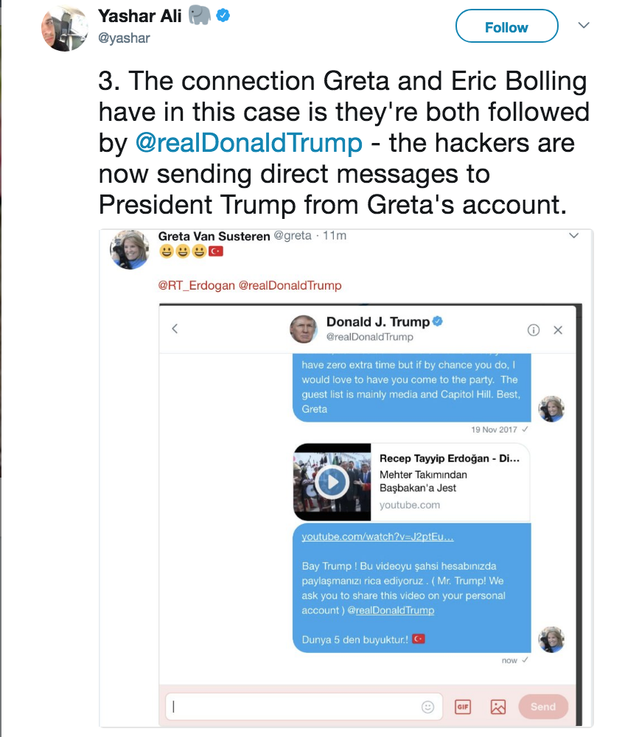
Last Friday, the hackers obtained access to Fox News’ Brit Hume’s account, and tweeted, “Your data and your DM correspondence have been captured! The Turks will never forget, neither what is done nor what is evil.” Then, this week, they took over Sheriff David Clarke’s account, and tweeted similar messaging from it.
According to a McAfee report about the attacks, the hackers accessed the accounts using other accounts they had already compromised. The hackers used these compromised accounts to send DMs to other users with links to spoof Twitter login pages meant trick people into entering their Twitter credentials; some did.
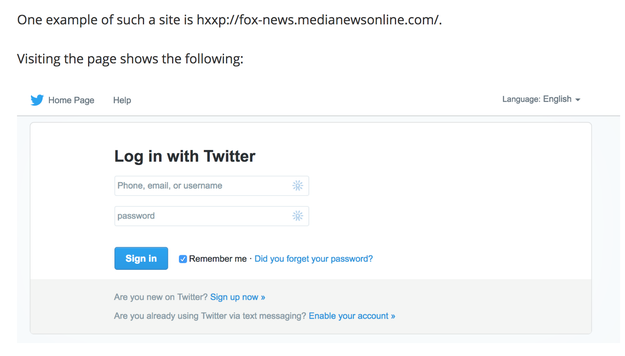
Screengrab of a Mcafee post detailing the hack. A spoof login Twitter page like this one was used by the hackers to obtain login credentials to Twitter accounts belonging to prominent US conservatives.
Mcafee
When reached by BuzzFeed News, Ayyildiz Tim shared a long statement in Turkish accusing the US of being child killers and starting wars in Iraq, Libya, Syria, Iran, Palestine. “We have thousands of digital data of America, we collected information through trojans. If we want, we would always be on top of the news but the biggest strategy is to know the strategy of the enemy,” the group said. It did not provide evidence to back up the claims.
Fox News Contributor Sara A. Carter's account seems to have been used to send at least some of the scam links. One link Carter appears to have sent was highlighted in the McAfee report. People on Twitter reported getting direct messages from her urging them to "Please read this important news," with the link to the phishing site. "You can access it from this link by logging in," the direct message continued. Carter did not respond to multiple interview requests.
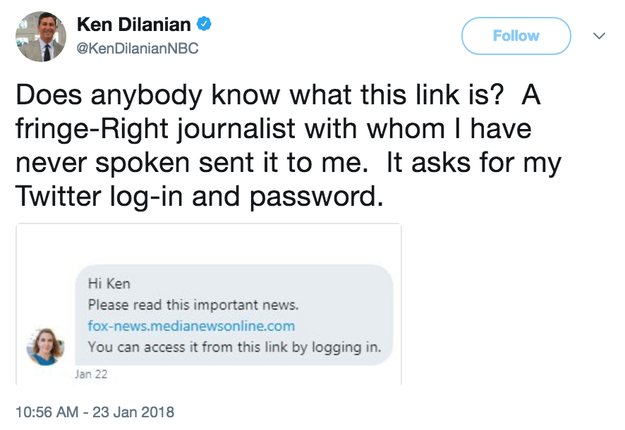
An example of the Twitter DMs the hackers sent to obtain login credentials to prominent US conservatives accounts. This one seems to show the DM came from Sara Carter's account.
The hackers did not limit their attempts to conservatives. They targeted New York Times reporter Rukmini Callimachi, as well as NBC reporter Ken Dilanian and CNN's Brian Stelter.
This is not Ayyildiz Tim’s first high-profile hacking. The group hacked and defaced the UN’s Ethiopia page in 2013. It hacked actor Kirk Cameron’s Saving Christmas movie’s webpage in 2014. And it also claimed it hacked Israel’s Iron Dome missile defense system — a boast that drew some media coverage until it proved to be bogus.
With some help from Twitter, Sara Carter is once again tweeting from her account. “My account was hacked and now it's back,” she announced in a Thursday tweet “Thank goodness and thank you @Twitter for helping me regain control.”
After a string of humiliating security issues, Twitter had already proven itself to be a fraught platform for potentially world-changing communications from the President of the United States. The fact that a group of hackers were apparently able to get close to the president is worrisome, especially since it was a band unsophisticated hackers employing simple methods.
Contributing: Kevin Collier, Alp Ozcelik, Eric Morrow

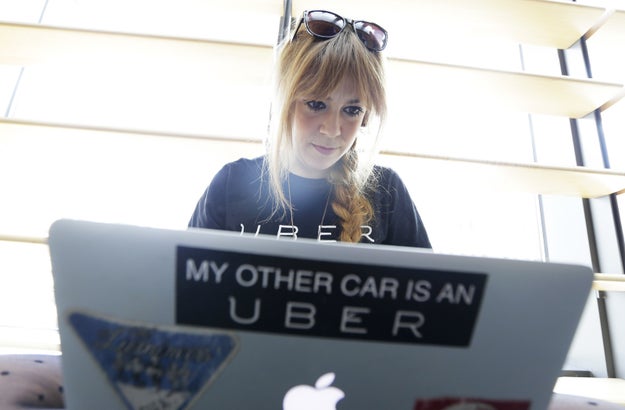

Jen Joyce, a Seattle-based community manager for the Uber rideshare service.
Ted S. Warren / AP
For years, Uber has battled driver complaints of unfair treatment. But this week, the $48 billion startup announced its interest in exploring state legislation that could provide certain benefits to gig workers, many of whom — along with lawyers and labor activists — have fought for years to be recognized as employees.
On the surface, the surprising news implies that Uber’s sense of responsibility to its massive independent contractor workforce has shifted. But critics say it’s little more than a PR scheme designed to distract from Uber’s years-long battle with the Teamsters’ union in Seattle.
“The world of work is changing,” reads the letter, which was published Tuesday and co-signed by CEO Dara Khosrowshahi. “At a basic level, everyone should have the ability to protect themselves and their loved ones when they’re injured at work, get sick, or when it’s time to retire.”
Setting aside the fact that Uber is one of, if not the, most potent technological forces driving these changes in the so-called “world of work,” the company’s interest in extending further support to gig workers is big — and surprising — news. But the announcement also has the potential to deal a fatal blow to one of the country’s only promising attempts to give Uber drivers real collective bargaining power via a union.
The letter in question, while vague, loosely outlines how both Uber and other gig economy companies could potentially help gig workers pay for benefits like unemployment insurance or workers’ compensation by jointly paying into a fund that the worker, the other platforms they work on, and the government also contribute to. It doesn’t offer any specific details about how such a deal would actually work, and Uber told BuzzFeed News it’s more of a starting point than a real policy proposal.
The controversy, however, isn’t over what is or isn’t in the letter, but who signed it.
The Service Employees International Union’s David Rolf, along with venture capitalist and civic activist Nick Hanauer, have been trying to advance portable benefits as a pragmatic solution to the gig economy problem for years. Rolf is the president of an SEIU local in Washington state, which represents home care workers, not drivers. He and Hanauer have been working on portable benefits legislation in Washington state since last year, which West Coast representatives for Uber say is when the company first became interested in working with them on the policy.
But labor activists say Rolf’s willingness to work with Uber has created an opportunity for the company to legally enshrine the drivers’ status as independent contractors, not employees, and makes Uber look willing to work with labor, despite its strident campaign against the Teamsters in Seattle.
“This isn't just a matter of Washington state,” said Hector Figueroa, an executive with an SEIU local in New York. Years of observing Uber’s tactics on the ground have left him wary of cutting any deal with the company. “Washington is opening the door for something we believe is harmful for workers. So we’re going to oppose it, even though a sister union is actively involved.”
Traditional labor organizers like Figueroa want Uber drivers to be classified as employees, not as independent contractors. This would give drivers the protection of minimum wage laws, while also guaranteeing them certain benefits, like paid sick leave. The organizers’ concern is that if labor collaborates with Uber on portable benefits policy, the legislation will cement drivers’ status as contractors, which would compromise their rights and bargaining power while making Uber look both innovative and generous.
In Seattle, Uber has actively fought against efforts by the Teamsters to organize drivers. The city of Seattle passed an ordinance in 2015 that allowed workers to organize and collectively bargain against ride hail companies like Lyft and Uber even though they weren’t employees. But the law, the first of its kind and a policy innovation, didn’t get those interested in unionizing drivers very far.
While Uber fought the Teamsters on the ground level, programming an anti-union podcast and offering free pizza to drivers who came to anti-union meetings, the Seattle Chamber of Commerce filed a lawsuit and tried to fight the bill in the courts. Right now, the bill is hung up in the 9th circuit, and the Teamsters, despite having won their application to represent drivers, is still waiting on a list of driver names and contact info that would allow them to begin their organizing campaign.
The Teamsters in Seattle said they got no warning about the deal between Rolf and Uber at all. Rolf’s office blamed a miscommunication, and said the Teamsters union efforts have his full support. “We support the Teamsters efforts in organizing,” he told BuzzFeed News. “We've always worked well together with the Teamster organization, and we expect to on this issue as well.
But some say that whatever Rolf’s motives might be, his decision benefits Uber without securing any real guarantees for the drivers.
“Striking a top-down deal with a corporation does not replace organizing. It's not innovative. It's a cop out,” said Bhairavi Desai, president of the New York Taxi Workers’ Alliance, which has fought Uber on behalf of workers since it launched. “There's no doubt this is meant to give Uber some kind of political cover.”
The Teamsters said drivers they spoke to were “excited to hear that benefits for workers have started to be part of the conversation at Uber.” But a spokesperson also pointed out that there’s “nothing holding companies back from offering benefits to workers who need them today,” and that the bill does nothing to address other concerns drivers have, like higher pay and more respect.
The spokesperson said the Teamsters’ organizing efforts in Seattle would continue, but declined to say whether the Teamsters intend to sign on to Uber’s portable benefits letter.
A representative for Uber in Seattle said the company continues to oppose unionization efforts in Seattle, saying “the notion that the Teamsters are the appropriate rep is one I would challenge.”
While Uber has co-signed a letter with Rolf expressing interest in exploring the possibility of portable benefits, the company has not actually co-signed the proposed legislation, which in its current form asks for employers to contribute 25% per transaction to the fund, or $6 an hour, whichever is higher.
Rolf said he expects, as the bill moves through the legislature, there will be a healthy debate over how much money each party should contribute. “The companies will want to go to low, and the worker advocates will want to have a rate that is equivalent to a W-2 employee,” he said.
Uber’s letter said the plan is to find a compromise that addresses “the need to promote a rising standard of living as well as healthy, profitable businesses.”
For Rolf, getting Uber on board with portable benefits is a coup. Other supporters of the idea, including Virginia democrat Senator Mark Warner, who has proposed federal portable benefits legislation, tweeted their approval of the deal.
“A number of other on-demand companies voiced their support for these principals two years ago,” Rolf said. “Uber was under different leadership then. They obviously had some reputational issues. It seems to me there's maybe a different philosophy at the top of the organization now about working with others.”